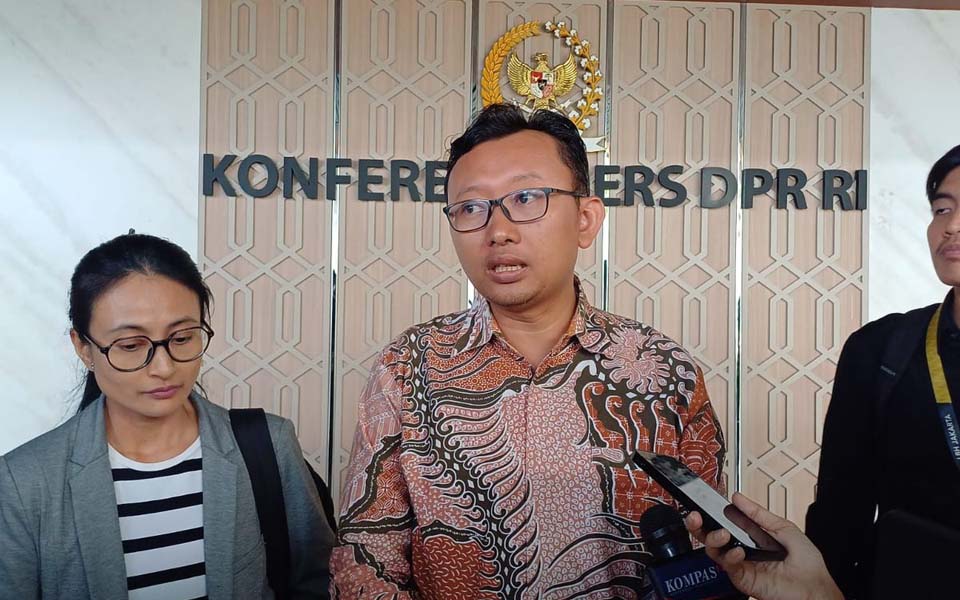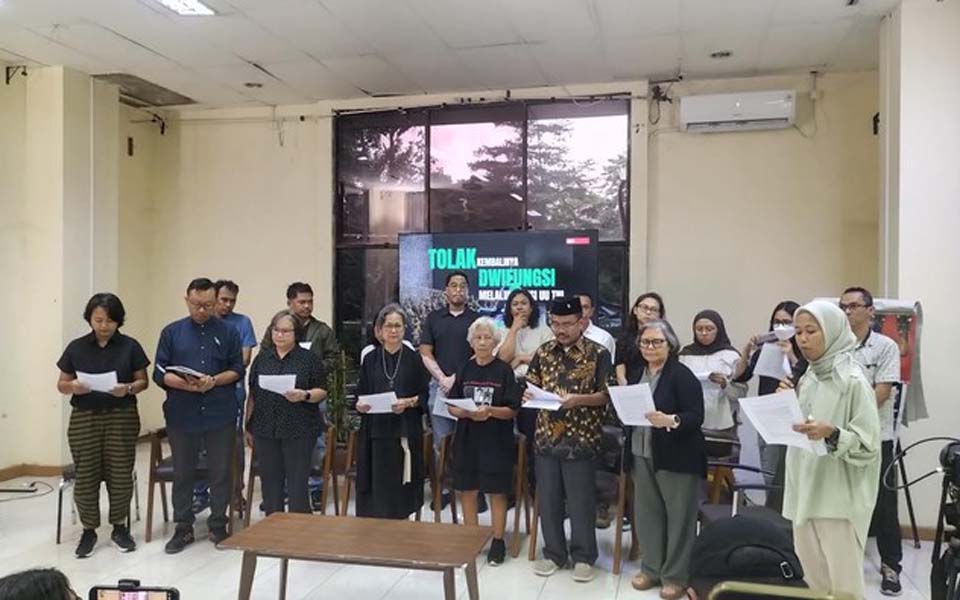Sabrina Asril, Jakarta – A House of Representatives (DPR) plenary meeting on Thursday September 29, 2022, agreed to remove Constitutional Court (MK) justice Aswanto, even though his tenure was not due to end until 2029.
Ignoring criticism from all sides, Senayan – as the parliament is known – stuck with the controversial decision and appointed then Constitutional Court Secretary General Guntur Hamzah as Aswanto's replacement.
"Is their agreement not to extend the tenure of constitutional justice Aswanto, a proposal originating from the DPR, and appoint Guntur Hamzah as a constitutional justice as proposed by the DPR, can there be agreement on this?", asked DPR Deputy Speaker Sufmi Dasco as the chair of the plenary meeting.
Five political party factions agreed, one accepted the proposal with a proviso, one opposed the proposal, and two were not present. Aswanto was thus forcibly removed from his throne.
Later, DPR Commission III Chairperson Bambang "Pacul" Wuryanto from the ruling Indonesian Democratic Party of Struggle (PDI-P) faction revealed the reason behind the parliament's removal of Aswanto.
Aswanto was seen as often annulling laws produced by the DPR, even though he was appointed to the post of constitutional justice by Senayan itself.
"Basically, you're not committed, so you know. Not committed to us, yeah, so sorry, we have the right [to remove you] which is being used", said Wuryanto on Friday September 30, 2022.
Abracadabra, Jokowi signs Perppu
One of the laws that was annulled by Aswanto was Law Number 11/2020 on Job Creation (also known as the Omnibus Law on Job Creation), which the Constitutional Court ruled was conditionally unconstitutional on November 25, 2021, because it's formulation was flawed.
How could it not be so. The Jobs Law was deliberated and enacted in a period of just eight months in the middle of the Covid-19 pandemic, contained numerous typographical errors and there were several versions each with a different number of pages ahead of its enactment.
At the time, Aswanto along with four other constitutional justices (Wahiduddin Adams, Saldi Isra, Enny Nurbaningsih and Suhartoyo) were in the majority camp in finding that the law sided with employers and business and sidelined the interests of workers.
The other four justices, Anwar Usman, Arief Hidayat, Daniel Yusmic Foekh and Manahan Sitompul, were in the opposing camp (dissenting) and considered the Jobs Law to be constitutional, despite the many weaknesses in its formulation.
In Constitutional Court ruling Number 91/PUU-XVIII/2020, Aswanto et al were also of the view that the formulation of the Jobs Law did not involve any meaningful public participation. This violates the principle of transparency and openness in the formulation of legislation as stipulated by Law Number 12/2011 on the Drafting of Laws and Regulations (UU P3).
In the 448 page ruling, the Constitutional Court ordered that the law be revised within a maximum of two years.
The Palace however was determined to find a loophole so the legislation, which from the start had been promoted as a way of spurring economic growth, could be forced through a hole in a needle – as the saying goes.
On December 30, 2022, President Joko "Jokowi" Widodo issued a government regulation in lieu of law (Perppu) as a revision to the Job Creation Law, even though a Perppu should only be issued when there is a compelling crisis.
A presidential letter on approving the enactment of the Perppu into law was received by the parliament on January 9, 2023, right on the last day of the DPR 2nd session.
But according to Article 22 Paragraph (2) and Article 52 Paragraph (1) of the 1945 Constitution, a Perppu must be submitted to and approved by DPR at the next parliamentary session immediately after its issuance.
The fact was however, approval for the Jobs Law Perppu to be passed into law as Law Number 6/2023 only happened at the 4th session on March 21, not during the 3rd session.
Abracadabra, the Perppu signed unilaterally by Widodo was passed into law and again attracted protests from workers.
Workers submit judicial review
Scores of labour organisations then submitted a judicial review with the Constitutional Court in five different law suits with the cases numbers 40, 41, 46, 50 and 54/PUU-XXI/2023.
At the hearing to read out the court's decision on the law suit on Monday October 2, the Constitutional Court rejected the entire lawsuit and stated that the 2023 version of the Jobs Law was not formally flawed – the exact opposite of the November 2021 ruling.
In their considerations, the panel of judges said that the arguments of the plaintiffs had no basis according to the law.
First, on the matter of the DPR's delay in approving the Jobs Law Perppu, the court said it was natural if the DPR needed some time to determine if the Perppu should be enacted into law.
This is because the Jobs Law Perppu is an omnibus law which includes 78 cross-sectoral laws. The panel of judges also considered that the parliament did not show any indication of wasting time in studying the law after receiving the presidential letter.
Secondly, on the matter of not fulfilling the requirements of a compelling crisis, the Constitutional Court simply agreed with the government's argument that was conveyed during the hearings that a compelling crisis existed for it to be signed.
This compelling crisis was in the form of, "a global [economic] crisis that will have a significant impact on Indonesia's economy as a consequence of the uncertain geopolitical situation caused (one of the triggering factors) by the Russian-Ukrainian war added to by the situation (post) the economic crisis that occurred because of the Covid-19 pandemic".
The debate on the issue of a compelling crisis, according to the court, had already been resolved when the DPR agreed to enact the Perppu into law.
Third, on the issue of the lack of meaningful public participation in the formulation of the law, the Constitutional Court said that it does not apply to laws on establishing a Perppu, because a Perppu requires that it be enacted in a short time because of a compelling crisis.
"Considering that based on all the above legal considerations, the court is of the view, it turns out that in formal terms the process of formulating Law Number 6/2023 was not in conflict with the 1945 Constitution", said Constitutional Justice Guntur Hamzah in reading out the ruling's considerations.
"Therefore, Law Number 6/2023 still has binding legal force. Thus, the arguments of the plaintiff's appeal are unfounded according to the law in their entirety", continued Aswanto's replacement.
'Evil conspiracy'
If examined in terms of the judges, the position on the law by the constitutional justices that remained on the court since 2020 had not changed at all.
It was just that the composition was reversed with the absence of Aswanto and the presence of Guntur Hamzah: from the initial five versus four, to four versus five.
Wahiduddin Adams, Saldi Isra, Enny Nurbaningsih and Suhartoyo had now switched position to become the opposing party (dissenting).
Meanwhile Anwar Usman, Arief Hidayat, Daniel Yusmic Foekh and Manahan Sitompul were now in the majority camp because of the presense of Hamzah who considered that the Jobs Law does not violate the Constitution.
The Labour Party says that this cannot be separated from the conspiracy behind the DPR's unilateral replacement of Aswanto.
"The change of one MK judge, in this case Aswanto, explains it, the Labour Party is of the view there is an 'evil conspiracy' by the DPR and the government", Labour Party President Said Iqbal told journalist after the court hearing on Monday.
"Because from the reading [of the ruling] earlier, it clarified that the judge who replaced justice Aswanto was the determining vote in the earlier ruling which has now reversed to four in favour of the plaintiffs and five for the government and the DPR", he added.
The Labour Party claims that it will organise a national strike in late October or early November in response to the ruling. They also threatened to report the non-dissenting constitutional judges for ethical violations.
- See Workers rally in Jakarta as Constitutional Court rules on anti-worker Jobs Law. CNN Indonesia – October 2, 2023
[Translated by James Balowski. The original title of the article was "UU Ciptaker yang Tak Lagi Cacat Formil Usai DPR "Obok-obok" Komposisi Hakim MK".]















